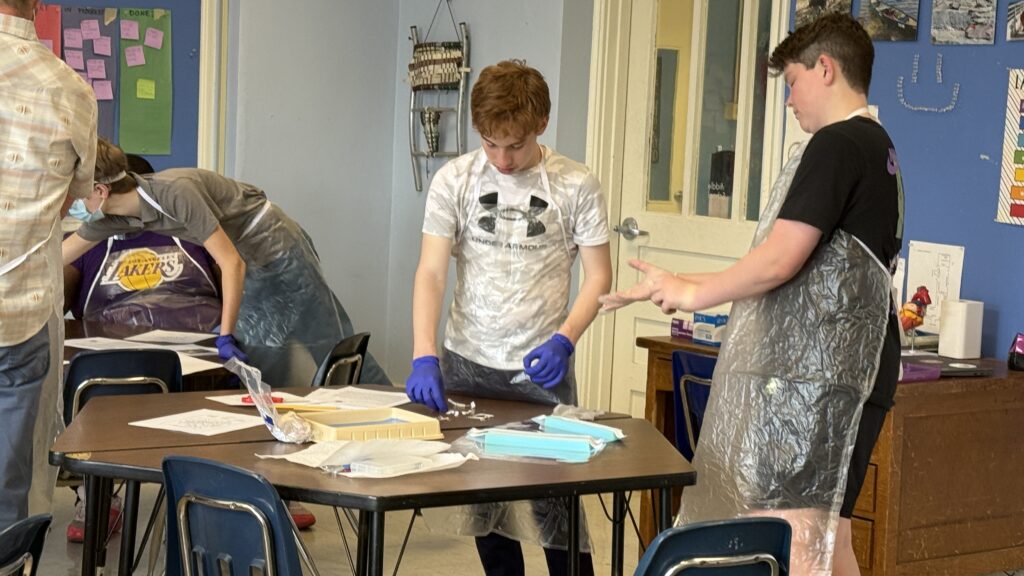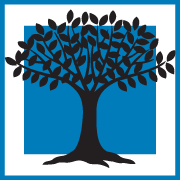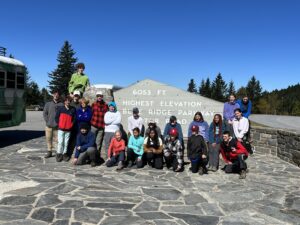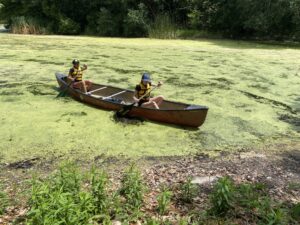Academics with Adventure. Learning with Purpose.
Middle School at The College School is about more than academic preparation and growth; it is also about social growth, self-awareness, and preparation for life. The Middle School experience is based on a challenging, thematically-integrated, experiential curriculum. Our program encourages risk-taking, builds confidence, nurtures creativity, fosters collaboration, celebrates diversity, develops leadership, and inspires lifelong learning.
Core Academics in Middle School
Click on any of the grade levels below to see an overview of core academics.
Math
• Master ratios, rates, and proportional relationships
• Apply concepts of fractions, decimals, and percentages
• Explore expressions, equations, and inequalities
• Investigate area, volume, and surface area
• Solve real-world problems involving data and statistics
Language Arts
• Analyze literature for themes, structure, and author’s craft
• Research and write evidence-based essays
• Strengthen skills in persuasive, narrative, short story, and informative writing
• Explore Greek and Latin roots to enhance vocabulary and word analysis skills, and deepen comprehension
Science: Physics
• Understand forces, motion, and laws of physics
• Investigate energy, work, and power through hands-on experiments
• Explore the properties of light and sound waves
• Develop inquiry skills through data collection and analysis
Math
• Solve equations and inequalities with precision and reasoning
• Explore linear relationships and graph equations
• Understand proportionality and slope in real-world contexts
• Work with geometric transformations and congruence
• Apply probability and statistical reasoning to data analysis
Language Arts
• Analyze complex texts for deeper themes, symbolism, and author’s intent
• Write persuasive, narrative, and research-based essays with clarity and voice
• Strengthen grammar, syntax, and academic vocabulary
• Develop critical thinking through debate and textual analysis
Science: Chemistry
• Explore the structure of atoms and the periodic table
• Investigate chemical reactions and the conservation of mass
• Understand states of matter and phase changes
• Experiment with acids, bases, and solutions
• Develop inquiry skills through data collection and analysis
Math
• Solve linear equations, inequalities, and systems of equations
• Explore functions and real-world applications
• Deepen understanding of geometric principles and proof writing
• Use data analysis and statistical reasoning to solve complex problems
Language Arts
• Conduct in-depth analysis of literature for themes, tone, and perspectives
• Write persuasive, narrative, and argumentative essays with advanced structure and style
• Explore creative genres, including memoirs, plays, and multimedia projects
• Develop public speaking and debate skills to articulate complex ideas
Science: Biology
• Explore cellular biology, including structure, function, and processes
• Engage in dissection to explore anatomy
• Understand genetics and the principles of heredity
• Investigate ecosystems, biodiversity, and interdependence in nature

Thematic Learning in Middle School
Each trimester, Middle School students dive into an intensive, immersive theme centered on a compelling topic that integrates multiple subject areas. This thematic approach allows students to make meaningful connections across disciplines, deepening understanding and encouraging critical thinking. See below for examples of Middle School themes.
Sixth Grade: Wilderness Experience
The Wilderness Experience is a theme that focuses on personal growth, teamwork, outdoor skills, and stewardship. Through weekly day trips, such as rock-climbing and canoeing, sixth graders experience challenges that help them develop a wide range of skills, which are tested during a culminating five-day backpacking expedition to Shawnee National Forest in southern Illinois. Throughout the theme, students learn to reflect upon and take responsibility for their learning. They discover more about their personal and collective strengths, ultimately learning that they can do more than they first thought they could. In the end, students learn many lessons, such as perseverance, trust, and cooperation, which they can then apply to many situations throughout their school and personal lives. Academic integrations include connected literature study, problem-solving skills, reflective writing, and research projects.
Sixth Grade: Know Your Civil Rights
During the third trimester, the Sixth Grade students explore the history of the Civil Rights Movement in the United States, examining key events, leaders, and legislation that shaped the fight for equality in an attempt to answer the following question: What is a government’s role in protecting the civil liberties of its people? Through engaging activities, primary source analysis, and discussions, students learn about pivotal moments such as the Montgomery Bus Boycott, the March on Washington, and the Civil Rights Act of 1964. This theme emphasizes the importance of justice, empathy, and active citizenship, encouraging students to connect historical struggles with ongoing efforts for civil rights today. The trimester endscwith a culminating project and a trip to the National Civil Rights Museum located in Memphis, TN.
Seventh Grade: Environmental Cycles
In Environmental Cycles, students look at a variety of environmental topics, including global access to resources and solutions of various types for uses of energy and pollution. Students engage in a variety of readings, in-class activities, documentaries, and field experiences as they learn about and discuss the issues that impact our world. Students also work on debate and presentation skills as they research and present issues of environmental concern that are of particular interest to them. Finally, throughout the trimester, students explore cycling as an alternative form of transportation. Students learn, among other things, how to perform trail bike maintenance, operate, follow, and create safety routines, and ride safely in a group on bike paths.
Seventh Grade: Urban and Social Justice Experience
As seventh graders explore the urban landscape, they wonder together about the many different aspects of community. Students learn to use public transportation, explore neighborhoods, and interact with residents and business owners to produce a final project concentrating on a relevant social issue and a reasonable solution or improvement related to that issue. In small groups, students travel to various St. Louis neighborhoods to conduct interviews, do research, and absorb the atmosphere that makes up a city. This theme also travels to Chicago for a five-day investigation of the city’s unique urban qualities, where students engage in shared experiences through cultural immersion, respectful debates, and written reflections.
Eighth Grade: Field Ecology
In Eighth Grade, students at The College School step into the role of field ecologists—scientists who study the living and non-living systems that make up our natural world. Throughout the trimester, students work together as a research team, learning the responsibilities, skills, and mindset of professional ecologists. Close to home, they embark on day trips around the St. Louis region, where they collect data from a variety of ecosystems. These experiences build a strong foundation in science while also strengthening critical skills in collaboration, problem-solving, and observation. The theme culminates in a nine-day expedition conducting site studies at various locations such as the Smoky Mountains, Black Balsam Knob, and the Nantahala Outdoor Center. Immersed in diverse landscapes—from mountain summits to rushing rivers—students deepen their studies, gather field data, and experience the adventure of living and working outdoors as a scientific team. Back at school, students analyze the data they’ve collected both collaboratively and individually. Each student then develops a unique research question and uses their findings to craft an evidence-based conclusion, just as scientists do.
Eighth Grade: “Now What?”
The “Now What?” Theme combines service learning with adventure education and reflection. Eighth graders engage in challenging experiences that require them to build and strengthen individual and group capacities. Through a variety of local service opportunities (e.g. work in the wilderness, in urban communities, and so on), students use the skills they have developed during their careers at The College School to give back to the community. Students interact with a variety of service-based organizations and professionals to learn about their fields. The course culminates in an adventurous six-day trip to New Orleans that provides the class with an extended service opportunity. Throughout the process, students work to identify deeper lessons from their College School careers to craft their graduation speeches.
Exploratory Classes
Exploratories meet three times a week and focus on science, social studies, foreign language, technology, physical education, and visual or performing arts. Each trimester, a student will be enrolled in four exploratory courses, for a total of twelve courses over the school year. Students have more than 40 choices of course offerings with subjects ranging from Legal Studies to Creative Writing, and from Rock Climbing to Japanese.
Click on the publication to see our current offerings!
Leadership Programs
Junior Leaders
One of the unique features of Adventure Education at The College School is student leadership. It is not enough for our students to rock climb, spelunk, or navigate urban neighborhoods – we expect students to lead in those environments by sharing the skills and confidence that they begin developing in the earliest grades. At the core of this philosophy is TCS Junior Leadership. This program gives Middle School students an extracurricular opportunity to volunteer in the service of our school. Among their many responsibilities, Junior Leaders may have the oppportunity to organize and maintain the Adventure Education gear room, assist earlier grades on campouts and field trips, and contribute to Adventure Education curriculum. Junior Leadership is an all-volunteer program that is open to students who qualify.
Student Service Leadership Program (SSLP)
The Student Service Leadership Program (SSLP) is a unique exploratory class that is offered to Eighth Grade students who have distinguished themselves through academics, service, and collaboration. Prospective students are selected by a committee of teachers and invited to participate in service learning projects within the school; their service work replaces one of their exploratories in the winter or spring trimesters. The projects depend on the interests and skill-set of the individual student. Some students work with younger grades, while others work on a project that would benefit the school as a whole. There are many possibilities, and the student is an active designer of his or her service experience.
Looking for a challenging and exciting Middle School experience? Click here to contact Admissions.







